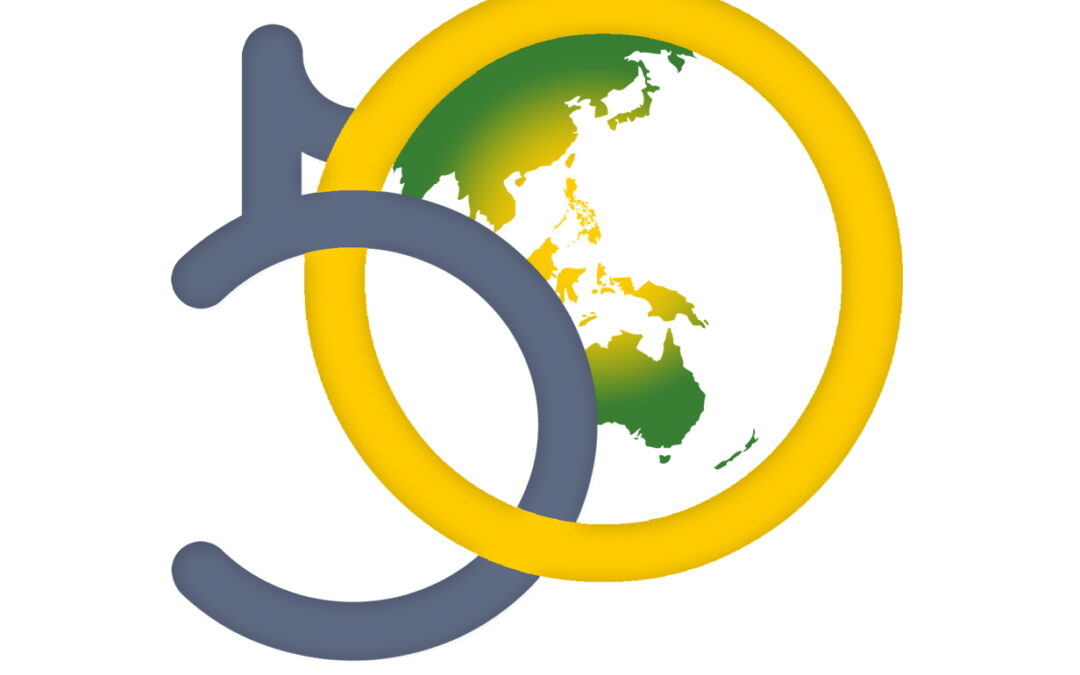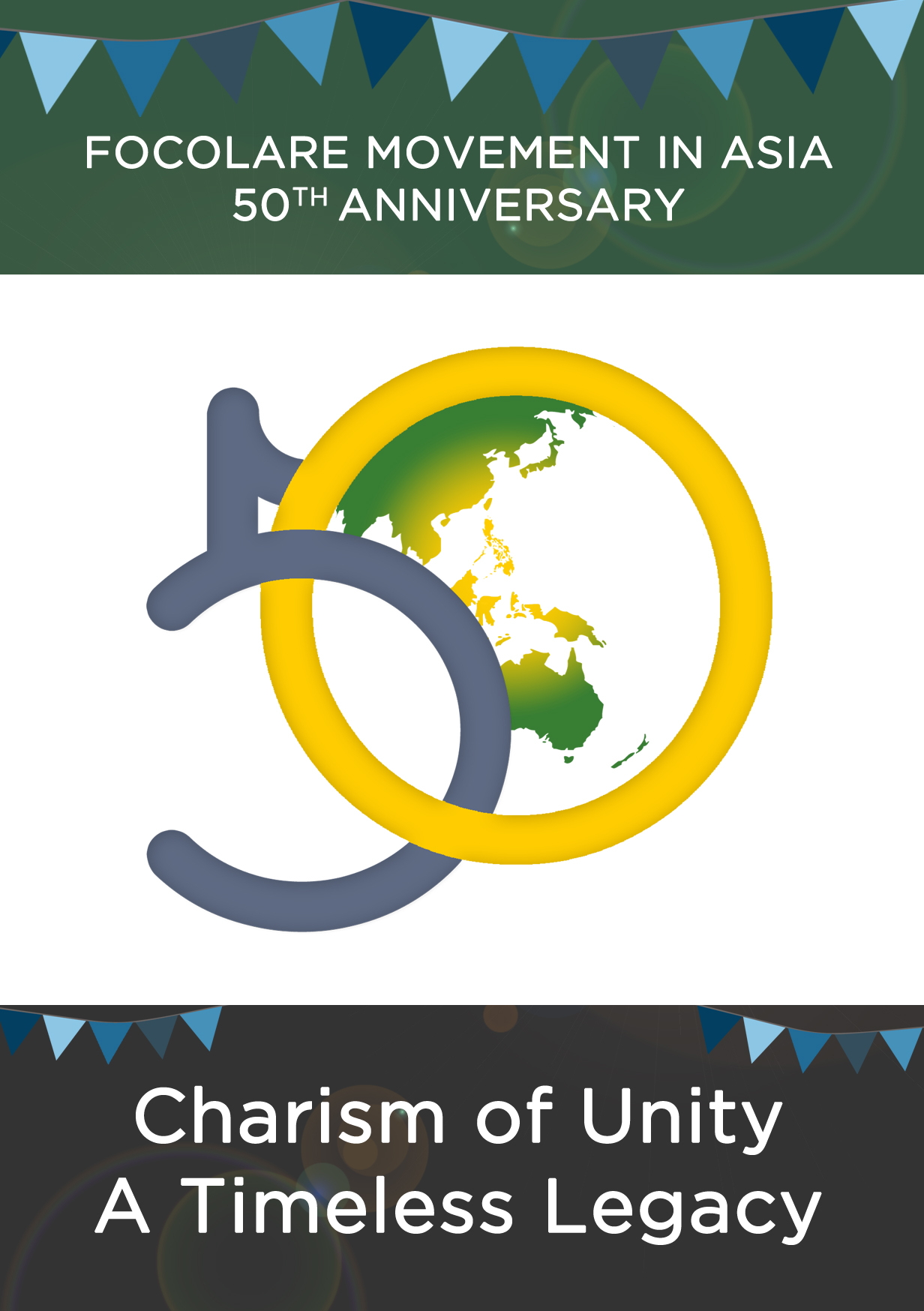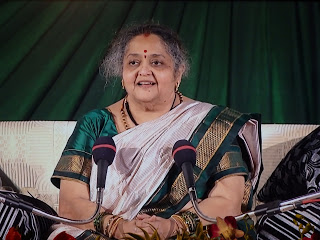
In India with the Swadhyaya Movement
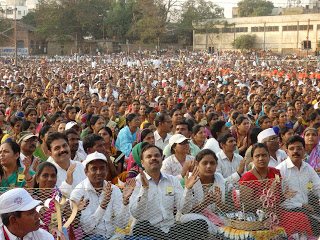 The city of Kolhapur hosted the meeting with some 50 thousand members and sympathisers of the Swadhyaya Movement which was founded by the Hindu reformer Pandurang Shastri Athawale and is currently guided by his daughter, Didi. A harmonious blend of ideals and intentions was born from the friendship between Didi and Chiara Lubich that grew over the years and continued with the election of Maria Voce Focolare president. Following the meetings between the women who succeeded the founders of those two movements, Maria Voce, Jesús Morán and the delegation from the Movement in Italy were invited to take part in the closing ceremony of a pilgrimage with some ten thousand couples from the Swadhyay Parivar Movement. The couples, who have been involved in the Hindu renewal movement, spent a week in contact with other families from the Kolhapur region sharing with them the ideals and spiritual life of their movement and paying a visit to the important temple of that region.
The city of Kolhapur hosted the meeting with some 50 thousand members and sympathisers of the Swadhyaya Movement which was founded by the Hindu reformer Pandurang Shastri Athawale and is currently guided by his daughter, Didi. A harmonious blend of ideals and intentions was born from the friendship between Didi and Chiara Lubich that grew over the years and continued with the election of Maria Voce Focolare president. Following the meetings between the women who succeeded the founders of those two movements, Maria Voce, Jesús Morán and the delegation from the Movement in Italy were invited to take part in the closing ceremony of a pilgrimage with some ten thousand couples from the Swadhyay Parivar Movement. The couples, who have been involved in the Hindu renewal movement, spent a week in contact with other families from the Kolhapur region sharing with them the ideals and spiritual life of their movement and paying a visit to the important temple of that region.  At the ceremony, which was held on a large plaza in the centre of the city, Didi Talwalkar told everyone about her friendship with Chiara Lubich, presenting Chiara as a Catholic leader and foundress of the Focolare Movement. Following a projection of photos showing the deep relationship between the two women, Maria Voce was asked to offer a greeting and the blessing of Chiara in the spirit of dialogue and shared membership in one human family as is written in the holy books of Hinduism like the vasudhavaiva kutumbakan. It was a very intense spiritual and emotional moment which strengthened the bond between the leaders of the two movements. The journey of these years has been a new experience of dialogue among the different relgions of India and Christians in the light of the spirituality of unity. It has been an experience of deep brotherhood at a living, but also intellectual level with valuable social projects. It continues to open paths of dialogue and knowledge of each other’s faith, in the light of the charism of Chiara Lubich, seen as a woman who knew how to read the signs of the times and who knew how to offer the world a spirit that could join everyone in a journey towards the Truth. The dialogue with Maria Voce and Jesús Morán during the February 13th telephone link-up ended with a question: “In the vast Hindu world where Christians are barely 2% of a population that exstends beyond one billion, what kind of impression does that leave you with? The Focolare president answered: “[It leaves me with the impression] of a small but alive Church, very alive.” “India is a large gift,” the co-president added. “They are very in favour of pluralism, and live it in an inclusive manner. They make space for each person to express their faith explicitly. This is a gift for the West, which lives pluralism in an almost excluding manner. Another thing is silence. Silence is necessary for every type of dialogue. Without interior and interpersonal silence, dialogue doesn’t have stand a chance.” Maria Voce concluded: “And this silence expresses the religious soul of the Indian people. As they said themselves: the gift that they can give the West is to make it rediscover the sense of God, sensing, feeling God.” See also: In India: a dialogue of hearts and minds
At the ceremony, which was held on a large plaza in the centre of the city, Didi Talwalkar told everyone about her friendship with Chiara Lubich, presenting Chiara as a Catholic leader and foundress of the Focolare Movement. Following a projection of photos showing the deep relationship between the two women, Maria Voce was asked to offer a greeting and the blessing of Chiara in the spirit of dialogue and shared membership in one human family as is written in the holy books of Hinduism like the vasudhavaiva kutumbakan. It was a very intense spiritual and emotional moment which strengthened the bond between the leaders of the two movements. The journey of these years has been a new experience of dialogue among the different relgions of India and Christians in the light of the spirituality of unity. It has been an experience of deep brotherhood at a living, but also intellectual level with valuable social projects. It continues to open paths of dialogue and knowledge of each other’s faith, in the light of the charism of Chiara Lubich, seen as a woman who knew how to read the signs of the times and who knew how to offer the world a spirit that could join everyone in a journey towards the Truth. The dialogue with Maria Voce and Jesús Morán during the February 13th telephone link-up ended with a question: “In the vast Hindu world where Christians are barely 2% of a population that exstends beyond one billion, what kind of impression does that leave you with? The Focolare president answered: “[It leaves me with the impression] of a small but alive Church, very alive.” “India is a large gift,” the co-president added. “They are very in favour of pluralism, and live it in an inclusive manner. They make space for each person to express their faith explicitly. This is a gift for the West, which lives pluralism in an almost excluding manner. Another thing is silence. Silence is necessary for every type of dialogue. Without interior and interpersonal silence, dialogue doesn’t have stand a chance.” Maria Voce concluded: “And this silence expresses the religious soul of the Indian people. As they said themselves: the gift that they can give the West is to make it rediscover the sense of God, sensing, feeling God.” See also: In India: a dialogue of hearts and minds
Unity, the leaven of society
 “The lines of John’s Gospel converge in the sentence which for quite some time has had deep and infinite meaning for me: ‘. . . may all be one. As you, Father, are in me and I am in you, may they also be in us, so that the world may believe that you have sent me’ (see Jn 17:21). This is how we are to live. [. . .] the Unity of the Church, the unity of those that find themselves beyond the confines of our Roman Catholic Church, the unity amongst all those who acknowledge faith in the one God, the Living One, and therefore with Jews and Muslims. That unity between Church and society in which the one does not find itself beside the other in a parallel sense or in an oppositional way, but Church and society enter into a reciprocal relationship, highlighting the fact that the unity which God gives is the leaven of society, the leaven that makes man free. It is the unity that makes us truly free, because we can only be ourselves in the fullest sense only where God has the right to be God in the fullest sense and therefore can give us everything He wishes to give us. And He doesn’t wish to give us anything less than His own interior mystery: Trinitarian unity. [. . .] But this is not a mere programme, because you never get very far with programmes. It must above all become life [. . .] I also have to begin to live this unity. And for this reason I trust in the fact that all of you, dear brothers and sisters, will help me, and that we can do this together, in reciprocity.” Bishop Klaus Hemmerle Source: W. Hagemann, Klaus Hemmerle innamorato della Parola di Dio, (Rome: Città Nuova, Rome, 2013) p. 337-338.
“The lines of John’s Gospel converge in the sentence which for quite some time has had deep and infinite meaning for me: ‘. . . may all be one. As you, Father, are in me and I am in you, may they also be in us, so that the world may believe that you have sent me’ (see Jn 17:21). This is how we are to live. [. . .] the Unity of the Church, the unity of those that find themselves beyond the confines of our Roman Catholic Church, the unity amongst all those who acknowledge faith in the one God, the Living One, and therefore with Jews and Muslims. That unity between Church and society in which the one does not find itself beside the other in a parallel sense or in an oppositional way, but Church and society enter into a reciprocal relationship, highlighting the fact that the unity which God gives is the leaven of society, the leaven that makes man free. It is the unity that makes us truly free, because we can only be ourselves in the fullest sense only where God has the right to be God in the fullest sense and therefore can give us everything He wishes to give us. And He doesn’t wish to give us anything less than His own interior mystery: Trinitarian unity. [. . .] But this is not a mere programme, because you never get very far with programmes. It must above all become life [. . .] I also have to begin to live this unity. And for this reason I trust in the fact that all of you, dear brothers and sisters, will help me, and that we can do this together, in reciprocity.” Bishop Klaus Hemmerle Source: W. Hagemann, Klaus Hemmerle innamorato della Parola di Dio, (Rome: Città Nuova, Rome, 2013) p. 337-338.
Solidal “low-cost”holiday in Argentina
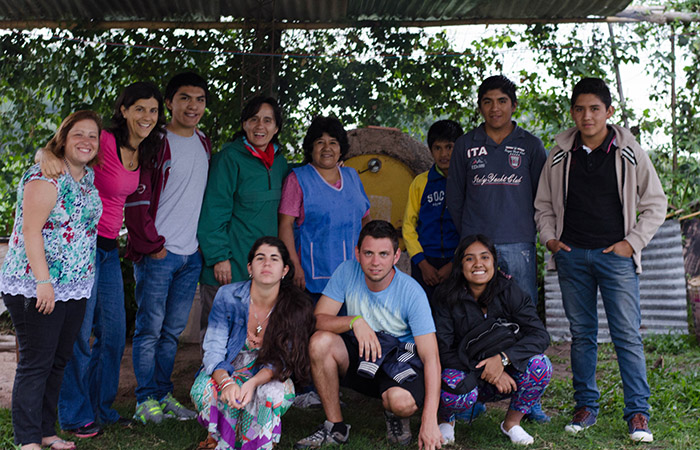 In El Espinal, a town in the province of Salta, Northern Argentina, 35 young people aged 18 to 30 from Argentina and Paraguay spent time together from 3 to 11 January, for a low-cost holiday but of “elevated levels of unity,” as they called it. In fact, also the Pastoral for Tourism –Programme for the Development of Solidal Tourism of that region also signed up for this project. This concerned firstly, living with the community and youth of the place, sharing their work in the tobacco fields with the beehive breeders and weavers, and also the typical difficulties of daily living in the countryside: cold water, lack of electricity, the mud that seems to seep through everywhere… The first point was: leaving behind commodities and prejudice. The Golden Rule “Do to others what you would like others to do to you” expressed in a nutshell what the youth of the Focolare wanted to fulfill in that community. But how were they supposed to accomplish it? It was first of all through an infinity of simple acts of love, and then with a cinema forum, meetings, an excursion, moments of relaxation, eating, dancing and singing together.… But the message was conveyed also through theatre plays that showed how El Espinal would be if everyone lived this simple rule. And who knows why this was so – perhaps for that reality “give and you shall be given” which always comes true – a competition of love triggered, where all gave their best. Maga recounts: “We will never forget how Pilar, a weaver, brought the best set of cutlery she had, to offer us a savoury soup, not to mention the ladies who set their chores aside to come and bake bread with us, and the enthusiasm of the boys and girls who fried doughnuts until late t night to make us feel at home. Then there were those who hosted us in their homes, giving us all they had to make us comfortable. There were so many new faces: and in each was Jesus who came towards us every time.” But the so-called holiday also had another objective, and this was to engage in a project to develop the Tourism Pastoral, which consisted in helping the population to see the touristic potential of their town. This was the main aim behind the organisation of activities that could later be transformed into concrete proposals for future visitors: trekking along the river, horseback riding, tractor excursions, and sight-seeing in the enchanting and hidden places of El Espinal.
In El Espinal, a town in the province of Salta, Northern Argentina, 35 young people aged 18 to 30 from Argentina and Paraguay spent time together from 3 to 11 January, for a low-cost holiday but of “elevated levels of unity,” as they called it. In fact, also the Pastoral for Tourism –Programme for the Development of Solidal Tourism of that region also signed up for this project. This concerned firstly, living with the community and youth of the place, sharing their work in the tobacco fields with the beehive breeders and weavers, and also the typical difficulties of daily living in the countryside: cold water, lack of electricity, the mud that seems to seep through everywhere… The first point was: leaving behind commodities and prejudice. The Golden Rule “Do to others what you would like others to do to you” expressed in a nutshell what the youth of the Focolare wanted to fulfill in that community. But how were they supposed to accomplish it? It was first of all through an infinity of simple acts of love, and then with a cinema forum, meetings, an excursion, moments of relaxation, eating, dancing and singing together.… But the message was conveyed also through theatre plays that showed how El Espinal would be if everyone lived this simple rule. And who knows why this was so – perhaps for that reality “give and you shall be given” which always comes true – a competition of love triggered, where all gave their best. Maga recounts: “We will never forget how Pilar, a weaver, brought the best set of cutlery she had, to offer us a savoury soup, not to mention the ladies who set their chores aside to come and bake bread with us, and the enthusiasm of the boys and girls who fried doughnuts until late t night to make us feel at home. Then there were those who hosted us in their homes, giving us all they had to make us comfortable. There were so many new faces: and in each was Jesus who came towards us every time.” But the so-called holiday also had another objective, and this was to engage in a project to develop the Tourism Pastoral, which consisted in helping the population to see the touristic potential of their town. This was the main aim behind the organisation of activities that could later be transformed into concrete proposals for future visitors: trekking along the river, horseback riding, tractor excursions, and sight-seeing in the enchanting and hidden places of El Espinal. 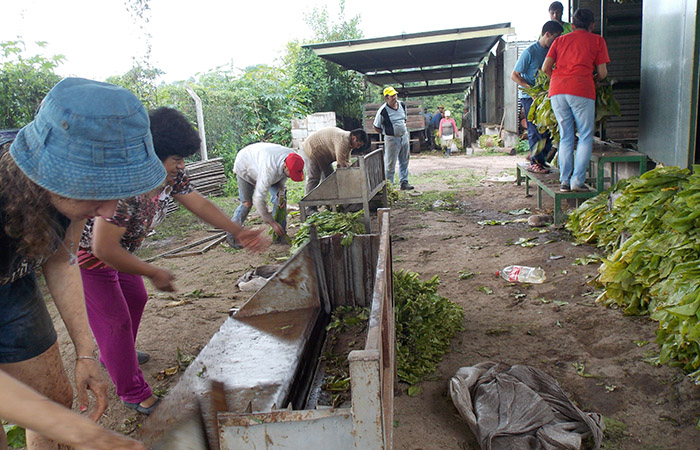 Among the breathtaking landscapes, sudden climate changes, the sun, animals and insects – at times not valued – everyone felt they could “feel God’s presence and the embrace of his creation” and also the relationships established among the youth, which were really enriching. In short, they spent a different type of holiday in the beautiful province of Salta, while adhering to Pope Francis’ invitation to live the Gospel in the outskirts. Before returning to their cities, they expressed their impressions: “I learnt a lot of things: to be happy with the little we have and not to complain, and live the golden rule. I felt loved and welcomed. All has left a deep mark in me. It was the best way to start the year. Thanks to you all, I have come closer to God.” Other impressions: “We shall leave with our hearts full of stories, experiences, their values, life, light and joy. I again discovered that if we live together for the others, everything else will come as an extra enrichment.” But also the local youth expressed themselves: “You are the best friends Jesus has given me.” “You have filled us with smiles, joy and peace.” Dominga wrote a prayer which she shared with us: “Thank you Jesus for being here and for giving me so many brothers as a gift. I discovered You in each one of them. Lord, teach us to dream big, and of beautiful things that expand our hearts.”
Among the breathtaking landscapes, sudden climate changes, the sun, animals and insects – at times not valued – everyone felt they could “feel God’s presence and the embrace of his creation” and also the relationships established among the youth, which were really enriching. In short, they spent a different type of holiday in the beautiful province of Salta, while adhering to Pope Francis’ invitation to live the Gospel in the outskirts. Before returning to their cities, they expressed their impressions: “I learnt a lot of things: to be happy with the little we have and not to complain, and live the golden rule. I felt loved and welcomed. All has left a deep mark in me. It was the best way to start the year. Thanks to you all, I have come closer to God.” Other impressions: “We shall leave with our hearts full of stories, experiences, their values, life, light and joy. I again discovered that if we live together for the others, everything else will come as an extra enrichment.” But also the local youth expressed themselves: “You are the best friends Jesus has given me.” “You have filled us with smiles, joy and peace.” Dominga wrote a prayer which she shared with us: “Thank you Jesus for being here and for giving me so many brothers as a gift. I discovered You in each one of them. Lord, teach us to dream big, and of beautiful things that expand our hearts.”
Ilanthalir (“tender shoots”) project in India
